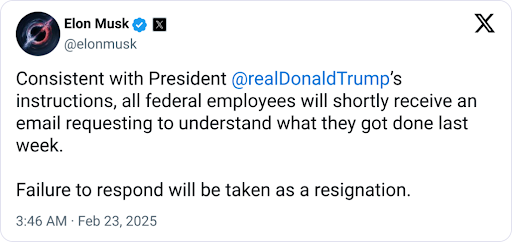Is Work-Life Balance Bullsh*t?
Semantics, not solutions
Posted on:
Do you believe in having a life outside your job? Because Elon Musk sure doesn't! Last Saturday, the head of the Department of Government Efficiency posted this on X:

Federal workers, who received the aforementioned email over the weekend with the subject line “What did you do last week?”, were told to “Reply to this email with approx. 5 bullets of what you accomplished last week and cc your manager".
This is the definition of micromanagement – and as Inc.com puts it, "micromanaging your employees into fear for their jobs is the one thing no leader should ever do". It's a common red flag for work-life balance, and no coincidence that over the past few months, I've seen tons of social media chatter on this subject. Execs are coming under fire for blatantly not caring about employee wellbeing: like 23-year-old founder Daksh Gupta, who blew up for telling candidates during the interview process that his company offers “no work-life-balance, typical workdays start at 9am and end at 11pm, often later, and we work saturdays, sometimes also sundays”.
These viral moments are part of a bigger conversation. Jeff Bezos famously doesn't believe in work-life balance and instead calls it “work-life harmony” (because he sees it as more of a circle than a balancing act). Ariana Huffington and James Watts call it “work-life integration”. Like Gupta, Elon Musk also wants X employees to work 84 hours a week; meanwhile Jack Ma wants Alibaba employees to work from 9am to 9pm, 6 days a week – aka the 996 work system, which is illegal in China.
“Balance", "integration”, “harmony”… that's just semantics. There's never going to be a perfect 50/50 split between work and life, so I'll concede that perhaps the term “balance” has a confusing connotation (like a perfectly even set of scales ⚖️). Personally, I’m less concerned about what we call it – arguing about terminology is distracting us from the fact that the message a lot of these leaders seem to be sending is: employee wellbeing is collateral damage in building big business.
I've worked at a Sequoia-backed startup, I've been a corporate grunt at Amazon, and I'm now self-employed – so I feel pretty qualified to provide a well-rounded perspective. Here's what I think: expecting employees to minimise their own lives in service of maximising shareholder value is exploitation, pure and simple. Exploitation is how big business is usually built – the World Economic Forum examined in a 2024 article how corporations are fuelling inequality; speaking from experience, Jeff Bezos did not get to where he is by caring about employee
wellbeing.
You also can't have this conversation without talking about privilege. BrewDog founder James Watts posted a very cold take on “not believing in work-life balance" because “when you find work that brings you meaning, you don't want to stop”. Thanks a bunch you literal beer-brewer, now go tell that to an investment banking analyst working 120-hour weeks and sleeping under their desks…?! I'm also a purpose-driven founder now who finds meaning in my work, but I remember what it was like to slave away at an entry-level job for an unlivable wage and it was not worth sacrificing my health for. Not everyone has the privilege of doing what they love.
I don’t claim to have all the answers, but this post was partly inspired by a thought-provoking video from Gary’s Economics. He talks about how some influential voices like Elon Musk seem to frame work and success as a kind of “Squid Game,” where the goal is to be part of the winning 1%, no matter the cost. His suggestion? Working together to change the rules of the game.
I’ll admit, there are moments when the idea of trading it all in for a quieter life by the sea – surfing, spearfishing, and living simply feels incredibly tempting. That said, I found Gary's words a really inspiring rally cry and while I am just one person, I believe in changing the system from the inside out. So the way in which I'm choosing to help is by elevating the wellbeing of employees around the world – because we're most effective at driving change when we prioritise our health. What's your take – are we young professionals asking for too much? Is work-life balance bullshit?